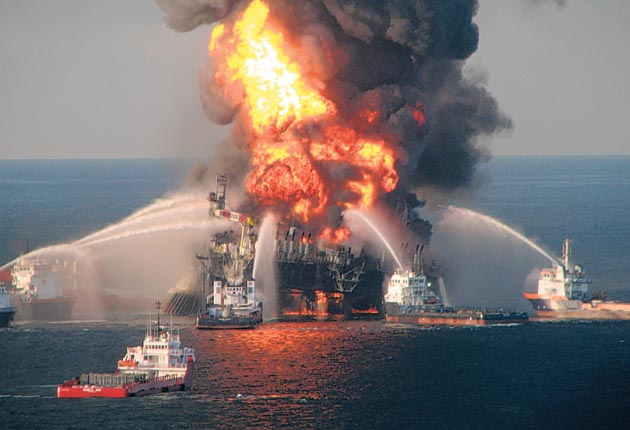Let us drill – or we may not have cash to pay Gulf claims
BP appeals to Congress as it considers banning firm from exploring US waters

Your support helps us to tell the story
From reproductive rights to climate change to Big Tech, The Independent is on the ground when the story is developing. Whether it's investigating the financials of Elon Musk's pro-Trump PAC or producing our latest documentary, 'The A Word', which shines a light on the American women fighting for reproductive rights, we know how important it is to parse out the facts from the messaging.
At such a critical moment in US history, we need reporters on the ground. Your donation allows us to keep sending journalists to speak to both sides of the story.
The Independent is trusted by Americans across the entire political spectrum. And unlike many other quality news outlets, we choose not to lock Americans out of our reporting and analysis with paywalls. We believe quality journalism should be available to everyone, paid for by those who can afford it.
Your support makes all the difference.With the permanent sealing of its blown-out well in the Gulf of Mexico perhaps just days away, BP is warning that it may not have the money to pay the colossal clean-up bill if Congress passes a law that would stop it obtaining permits for offshore drilling in US waters.
The new confrontation emerged yesterday as BP announced that total costs arising from the explosion of the Deepwater Horizon rig on 20 April, in which 11 workers died in one the worst environmental disasters in US history, rose by a further $2bn last month to around $8bn.
The law in question was passed by the House of Representatives just before Congress's summer recess but is still awaiting approval in the Senate. It would bar any company from drilling on the US outer continental shelf if more than 10 people had been killed in accidents at facilities it operates – either onshore or offshore – or if it has been fined $10m or more in the past seven years for violating US anti-pollution laws.
BP is not specifically mentioned in the measure but it is the only company that would qualify for such a ban. The Bill's chief sponsor, the California Democrat George Miller, has made it clear that BP was the intended target.
For the company, such a ban would strike at its biggest source of revenue and profits. BP is the biggest single oil company operating in the Gulf, and the 400,000 barrels a day it produces there represent 11 per cent of its total global output, accounting for an estimated 25 per cent of annual profits that reached $14bn in 2009.
"If we are unable to keep those fields going, that is going to have a substantial impact on our cash flow, David Nagel, the executive vice-president of BP America, told The New York Times, "and that makes it harder to fund things, fund these programmes."
BP insists it is standing by its promised $20bn clean-up fund, which would also pay government fines and meet compensation claims for the spill that spewed 206 million gallons of crude for three months until it was provisionally plugged in mid-August. But Mr Nagel's words are a heavy hint that other projects, including a $500m research programme on the impact of the spill, could be endangered if the Miller Bill became law.
Meanwhile, plans proceed for a final sealing of the rogue well. This week, engineers removed its temporary cap as a prelude to raising the massive blowout preventer whose failure caused the disaster. The preventer is now a crucial piece of evidence in the investigation of the calamity.
It will be replaced by a new one to deal with pressure that may be caused when a relief well BP has been drilling finally intersects its blown-out Macondo well. This will allow engineers to permanently seal the broken well from the bottom with mud and cement. The operation is expected some time next week after the Labor Day public holiday.
In another piece of good news, it seems clear that a second explosion on an oil platform in the Gulf on Thursday caused no long-term damage. Unlike the BP incident, the blast took place not on a rig but on a fixed platform, Vermillion 380, owned by the Mariner Energy group.
All 13 workers were rescued and there was no report of any spillage at the seabed. Moreover, the accident happened in waters only 300ft deep, compared with a sea depth of a mile in the case of BP's Macondo well, about 200 miles to the east.
The Coast Guard initially reported that an oil sheen a mile long and 100ft wide had begun to spread. Hours later, however, it said crews were unable to find any spill.
Join our commenting forum
Join thought-provoking conversations, follow other Independent readers and see their replies
Comments